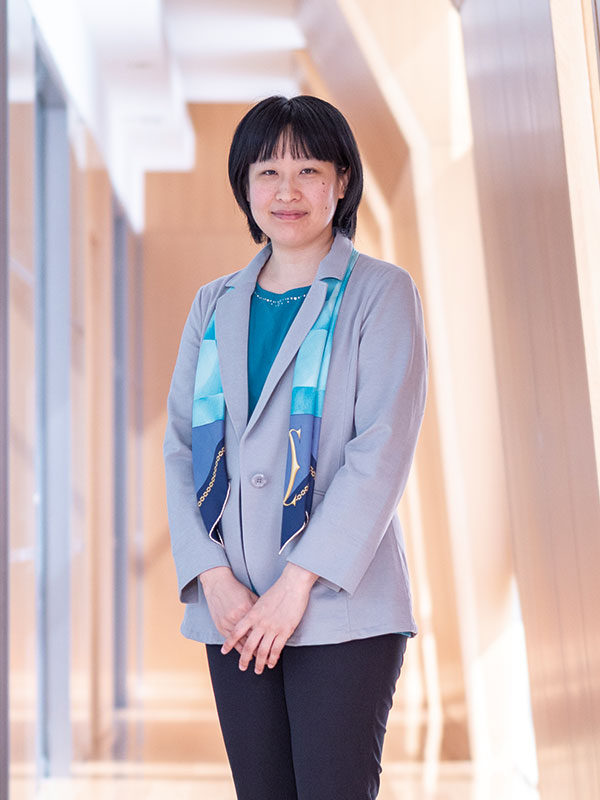A “general health practitioner” of AI and society

UTokyo 30s
Up-and-coming young researchers
Of the approximately 5,800 faculty members active at the University of Tokyo, we have selected nine energetic young researchers in their 30s. In terms of their job titles, there is one professor, two associate professors, one project associate professor, one lecturer, one project lecturer and three research associates. What kind of research are they engaged in day to day? And what is their temperament like? Let’s find out.
| Science and Technology Studies |
A “general health practitioner” of AI and society
 Arisa Ema Arisa EmaProject Assistant Professor, Institute for Future Initiatives |

The Observatory for Responsible Research and Innovation in ICT, a project organized under the auspices of the UK’s Engineering and Physical Sciences Research Council, recently held an event called “100 Brilliant Women in AI Ethics.” Among the names on the list of one hundred people active in the world of artificial intelligence (AI) ethics is a single Japanese name – that of Arisa Ema. And while Project Assistant Professor Arisa Ema’s curriculum vitae features roles that include the vice chair of the Ethics Committee of the Japanese Society for Artificial Intelligence, a board member of the Japan Deep Learning Association and a member of the Cabinet Office’s Council for Social Principles of Human-centric AI, this does not mean she is a specialist in creating AI.
“My academic background is Science and Technology Studies (STS). As an area of study, STS includes an aspect that points out underlying issues in society and an aspect that encourages society to take measures tackling those issues. It’s a field where extensive research is conducted on the relationship between society and information and communication technologies like AI. For this reason, I also have a role to play as a ‘general practitioner,’ advising people who want to know more about AI and society. I guess it’s like a liaison role in which I direct people to different divisions of expertise, like telling them to go to A for advice on technology, B for law, C for policy, D for business… ”
But she is not merely acting as a liaison. Since launching a research group to study the relationship between AI and society in 2014, Ema has organized a place to bring together experts involved with AI from across a variety of disciplines. Both the liaison service and network hub naturally call for a broad range of curiosity and knowledge. In this she seems to have benefited from the influence of the unique Steiner School she attended in Sydney, Australia as a child.
“For example, when the theme of the lesson was ancient Egypt, we learned how to make mummies, recreate cuisine from that era, write hieroglyphs and learn the arithmetic that was current at the time. What I found interesting is that there were no textbooks for the different subjects – rather, we touched on science, society, language and mathematics all within the scope of a single theme.”
The University of Tokyo's College of Arts and Sciences and the Graduate School of Arts and Sciences, where she would go on to study, are also departments marked by a strong interdisciplinary character across all fields. Her career, which has now been graced with multi-year appointments at Kyoto University’s Hakubi Center for Advanced Research, the University of Tokyo’s Komaba Organization for Educational Excellence and the University of Tokyo Institute for Future Initiatives, may be said to reflect the characteristics of this woman who conceives of herself as “interdisciplinary.” So what are Ema’s plans for her future career?
“At the moment I’m in an incredibly blessed environment where I have the freedom to pursue my research activities. As this is also a fast-moving field, it seems most congenial to me to proceed by recruiting colleagues on each theme to create nimble organizations in short cycles. I’d like to maintain the kind of lightness of foot that allows me to keep transitioning between outsider and insider, and between observer and performer.”
Incidentally, searching online for the keyword “Arisaema" returns hits for the scientific name of the flower known as jack-in-the-pulpit (genus Arisaema). These are perennial flowers also used in Chinese herbal medicine. This general practitioner, who often stimulates with provocative statements that ignore social conventions, on the other hand represents a medicine in her own right – one that may lead us closer to a resolution of social issues.
| Q & A | |
|---|---|
| What was the work that earned you the President’s Award in 2007? | “That was for a paper about a child surveillance system making use of RFID tags.” |
| What do you enjoy playing on the violin and viola? | “Works by Brahms and Lalo. I like chamber music that brings out the personalities of the individual musicians.” |
| What do you feel is different now than when you were in your twenties? | “I’ve learned how to sleep on airplanes when flying overseas for business trips.” |
| How are your thirties today compared to those of older generations? | “I feel that people who can take a realistic attitude and set their own pace have a better chance of survival.” |
| Book authored by Project Assistant Professor Ema: AI Shakai no Arukikata [A Traveler’s Guide to the AI Society] (Kagakudojin, 2019; ¥2,000 + tax) |
* This article was originally printed in Tansei 39 (Japanese language only). All information in this article is as of September 2019.






